food
Word of the Day: Stammtisch.
Word of the Day: Stammtisch.
A Stammtisch is a table for regulars at a coffee shop or restaurant. It names not just the table but the idea.
There’s something powerful in having a place where you regularly gather with others, a “third place” besides work and home. A lot happens at the water cooler, at the scuttlebutt, at church coffee hour.
Interestingly, many species of animals around the world have something like family reunions. Regular gatherings that reinforce bonds and serve to pass on knowledge to new generations.
We all benefit from the same thing. I’ve read of epidemics of loneliness; breaking bread with others might not be a cure-all for that, but I doubt it could hurt.
It probably shouldn’t surprise us that so many religions have gatherings around something similar: simple meals taken together as a community. As simple as bread and wine, or three palm dates.
I love learning new words, and hoarding them for my writing. I keep a file of good words, and try to include them in everything from my academic writing to my texts. If you’ve got some good words to share, I’d love to learn them!
Environmental Studies At Augustana - My recent interview with Lori Walsh on SD Public Radio
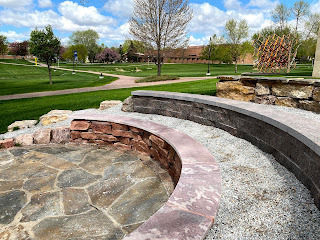 | |
| The Augustana Outdoor Classroom, designed by an Environmental Philosophy class. |
Aldo Leopold wrote that "there are two spiritual dangers in not owning a farm." Those dangers both add up to this: losing touch with the land and so with the very things that sustain our lives.
You can hear the full interview here.
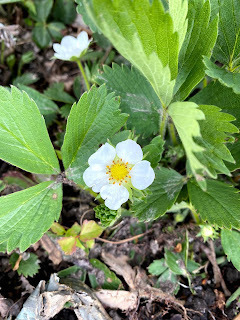 |
| Strawberries in spring bloom. Do you know where your food comes from? |
My thanks to Lori Walsh for being such a patient and thoughtful interviewer. In the past I've been interviewed while sitting with her in her studio. Phone interviews are new for me, and there's a little lag that has me talking over her unintentionally at the end. She rolls with it, unflappable and brilliant as always.
Butterflies In My Stomach
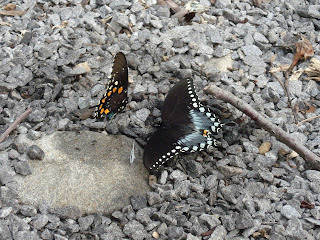 |
| Kentucky roadside butterfly banquet. Can you see the little one? |
Here is the danger of becoming a professor of Environmental Humanities: people begin to assume that you care about nature, and that you are willing to share what you know.
Both of these things are true, by the way. (Many of my photos of wildlife and nature are here, on my Instagram account. I do care, and I am delighted to share the little I know.)
Over the years, I have come to love insects. This has come about partly through my years studying trout, char, and salmon, and of the places they live. I've spent a good portion of the last decade walking Appalachian waterways from Maine to Georgia. Over that same time, I've walked hundreds of miles through the remaining forests of northern Guatemala and Nicaragua. As both a researcher and teacher I've walked through the mountains of the American West; and I've made similar excursions to the foothills of the Brooks Range, the Kenai Peninsula, and Lake Clark National Park in Alaska.
The fish that I love depend upon the insects, so, like so many people who gaze at salmonids, I have come to know many riparian insects.
Once you study the insects along the streams, you start to notice the other plants and animals that depend upon them, too. In Kentucky I have come upon a steaming pile of bear scat that was full of half-digested cicadas. I've started to notice the wings of insects, left behind by the birds that only eat the fleshy bodies of the bugs they catch.
 |
| Butterfly wing, left behind by birds. Guatemala. |
From there, it's not a big leap to realize that if the fish and the birds and the plants need the insects, then so do I. Butterflies and other insects feed the larger animals my species eats, and they pollinate the plants that feed us. All of us have the actions of butterflies in our stomachs. Can you see the lepidoptera in this next photo? There are quite a few of them, resting on the bark of this tree in Petén.
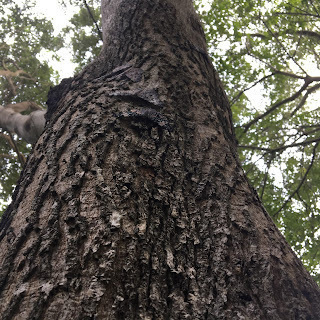 |
| Gray cracker butterflies, Petén, Guatemala. |
Little six-legged creatures feed us all. The small things matter.
And so do my students, even if they're not currently enrolled in one of my classes.
So in the past week I’ve gathered a few hundred of my best butterfly photos to share with my student. This photo is one of the worst in photo quality, but it’s a great image nevertheless:
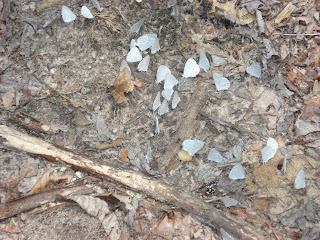 |
| Butterflies on the ground in Kentucky, 2008. |
I took this nine years ago in the mountains in Kentucky while working on my book on brook trout. Three distinct species of butterflies are gathered here, sipping minerals from the ground. My coauthor Matthew Dickerson and I came upon this arboreal banquet by chance.
I wish I'd had a better camera with me. For now, the blurry image is enough to bring to mind that memory of hundreds of lepidoptera sipping and supping together on the forest floor, filling their bellies with the bare earth before flying off to pollinate flowers that, through a complex net of relationships, would someday fill my belly too.
Steinbeck on Overfishing
John Steinbeck, The Log From The Sea Of Cortez. (Penguin, 1995, p. 205) Emphasis added. Feel free to substitute the name of any other coastal government for the word "Mexican."
Hope And The Future: An Open Letter To The President
I know you've got a lot on your mind right now, and I don't envy you the burdens of your office. I pray for you often, asking God to give you the wisdom to make good decisions and the strength to carry them out.
 I have two requests for you today. The first is, please don't give up on hope. In your first campaign you spoke about hope a lot, and I think you know that meant a lot to people everywhere. We all want hope, especially hope that we feel we can believe in. We will often settle for unreasonable hopes, but we prefer hopes that seem grounded in possibility rather than in wild fantasy. For a while there you sounded like you had both hope and reason for hope. When I think about the office you occupy, I imagine there's a lot that works to rein hope in, to tame hope and to break it. You start out with big ideals, and then everyone reminds you that limited resources will be made to seem even scarcer by partisan quarrels until there's nothing left to spend on dreams. But let me tell you this: we need you to make lots of small decisions, but we also need some big dreams, some reasonable hopes. We need someone who will climb the steps to the bully pulpit and preach a sermon that reminds us of "the better angels of our nature." Don't just make the little decisions; remind us of the great hopes that have lived in our nation.
I have two requests for you today. The first is, please don't give up on hope. In your first campaign you spoke about hope a lot, and I think you know that meant a lot to people everywhere. We all want hope, especially hope that we feel we can believe in. We will often settle for unreasonable hopes, but we prefer hopes that seem grounded in possibility rather than in wild fantasy. For a while there you sounded like you had both hope and reason for hope. When I think about the office you occupy, I imagine there's a lot that works to rein hope in, to tame hope and to break it. You start out with big ideals, and then everyone reminds you that limited resources will be made to seem even scarcer by partisan quarrels until there's nothing left to spend on dreams. But let me tell you this: we need you to make lots of small decisions, but we also need some big dreams, some reasonable hopes. We need someone who will climb the steps to the bully pulpit and preach a sermon that reminds us of "the better angels of our nature." Don't just make the little decisions; remind us of the great hopes that have lived in our nation.The second request is related to the first: I'd like you to help us to nurture the reasonable hope that we can find new ways of making energy. There are powerful sermons being preached about building more oil and tar sand pipelines so that the old ways can be maintained. But those are sermons without hope, the sermons of a creed doomed to perish in fire and smoke of its own burning, the platitudes born of a faith in a limited and dwindling resource. They are the cynical homilies of those who pass the collection plate and who think the worst thing they can lose is our regular tithing to the god of petroleum.
We need a reformation in that way of thinking.
Because national security is not just about defending ourselves with bullets and bombs, and it's not just about making sure we have enough oil. In the long run, national security has to mean that we have taken good care of the land, so that it is still worth inhabiting. That, in turn, means we have nurtured our hearts and minds and cultivated our virtue. What, after all, does it profit a nation to gain the world and lose its soul? We are a nation of innovators, not just custodians of the status quo. We began as an experiment, and it is in experimentation and new thinking that our hope now lies.
We can begin by directing more funding to universities. We need bright engineers who have the freedom and funds to investigate how to make more efficient solar and wind energy.
We also need bright students in the humanities who will help us form the best policies to make sure we use our technology well. After all, a democracy can live without engineers, but it cannot survive long without reporters, teachers, and lawyers.
We know that money spent on education pays a perpetual dividend to both the person educated and her whole community.
We can also encourage the creation of new and important prizes. Why should we not have more prizes like the Nobel Prizes? And why shouldn't such a proud and wealthy nation fund some of those prizes? You've got the ear of the world for a little while longer. Use that opportunity well, and urge us to put our private funds into prizes for people who advance the causes that matter most to humanity: growing good food, creating and preserving clean water, protecting the species God told us to care for, healing the sick, liberating captives, and making us better producers and consumers of energy.
I am grateful for people who willingly take on the burdens of public office. I don't imagine it is easy. You remain in my prayers.
David
Pornography and Prayer
"Repetitive viewing of pornography resets neural pathways, creating the need for a type and level of stimulation not satiable in real life. The user is thrilled, then doomed."Thankfully, "doomed" may be an overstatement. As William James and so many others remind us, our habits make us who we are, so we may be able to form new habits to supplant or redirect old ones. I'm no psychologist, but it seems obvious to me that what we hold in front of our consciousness will synechistically affect everything else we think about and do. So it is no surprise that the author of this WSJ article reports that viewing porn may lead to viewing women as things rather than as people.
To put it differently, everyone worships something, and what we worship changes us. This is one of the good reasons to engage in prayer and worship that are intentional. (On a related note, it's a good reason to forgive, too: forgiveness keeps us from internalizing the pain others have caused us, where it can fester and devour us from within.)
(If you read my writing with any regularity you will recognize these as themes I frequently return to. If you're interested, I've written more here and here.)
One of the problems of philosophy of religion has been to try to identify that which certainly deserves our worship. This quest for certainty has often (in my view) distracted us from the more important work of liturgy, wherein we acknowledge our limitations, including our uncertainty. A good liturgy involves worshiping what we believe to be worth worshiping, while acknowledging our own limitations. After all, if worship doesn't include humility on the part of the worshiper, it is probably self-worship.
Another way of putting this is in terms of love. Charles Peirce wrote about this more than a century ago. There are many forms of worship, many kinds of prayer. Without intending to demean the prayer and worship of others, Peirce nevertheless offers what seems to him to be worth our attention: agape love, the love that seeks to nurture others:
"Man's highest developments are social; and religion, though it begins in a seminal individual inspiration, only comes to full flower in a great church coextensive with a civilization. This is true of every religion, but supereminently so of the religion of love. Its ideal is that the whole world shall be united in the bond of a common love of God accomplished by each man's loving his neighbour. Without a church, the religion of love can have but a rudimentary existence; and a narrow, little exclusive church is almost worse than none. A great catholic church is wanted." (Peirce, Collected Papers, 6.442-443)Notice that Peirce uses a small "c" in "catholic." He wasn't trying to proselytize for one sect; quite the opposite. He was trying to proclaim the importance of a church - that is, of a community that shares a commitment to communal worship - of nurturing love.
I am not trying to moralize about pornography. In fact, I see some good in pornography, just as I recognize goodness in the aromas coming from a kitchen where good cooking happens. Pornography probably speaks to some of our most basic desires and needs, for intimacy, affection, attention, and love, as well as our simple, animal longings.
Still, like aromas from a fine kitchen, porn stimulates us without nourishing us. And by giving it too much attention we may be training ourselves to scorn good nutrition. The WSJ article suggests giving up the stimulation as a means of getting over it. I think this is incomplete without a redirection of the attention to what does in fact nourish us. Prayer and worship that refocus our conscious minds on what really merits our attention can prepare us to receive - and to give - good nutrition. That is, by shifting some of our attention from cherishing need-love to cherishing gift-love - from the love that uses others to the love that seeks their flourishing - we might make ourselves into the kind of great lovers our world most needs.
Empire and Total War
Of course I don't know, but it makes me think of a passage in the prophet Samuel. King David sends his army to fight, "in the season when kings go off to war," but he does not join them. He stays behind and winds up having an affair with a married woman, then arranging for her husband to die on the front lines to cover up David's dalliance. (By the way, David is remembered as one of the good kings.)
The bold passage above tells us something about the history of warfare: small states cannot afford total war. They can only go to war when their crops are in the ground, and must return before the crops are to be harvested. Not so with empires. Large states can draw soldiers from many places and so can afford to field an army year-round.
 |
| Sometimes you're just in the right place to capture the photo. The Blue Angels soar past Walmart. |
While King David's state was small enough that it was still bound by the growing season, he was enjoying a period when his state had grown large enough that he could send his troops out without joining them, without committing himself to sharing in their triumphs and losses. And this detachment of the leadership from the fighting forces led to deep tragedy, and even to a kind of human sacrifice, wherein the king was willing to sacrifice one of his men to cover up the king's own error.
So while I don't know why the suicide rate is increasing right now, I am not surprised to learn that our troops are suffering. We commit them to long tours of duty, not just for part of a growing season but for years on end with only short rests. It is lamentable that they are often so far from us it is hard to even imagine what they endure, much less to share in it with them.
See my earlier post on the cost of war here.
Gratitude
It being Thanksgiving, I’m doing some reading about gratitude. Just read through part of Norman Wirzba’s Living the Sabbath: Discovering the Rhythms of Rest and Delight. Chapter 1 has a section on food - very apropos for Americans this week - and in particular on the production of food.
Wirzba’s contention, one that strikes me as probably right, is that the way we produce meat is violent and alienating, and that our willingness to accept food that comes to us this way is symptomatic of a culture that is more motivated by fear than by gratitude.
This could turn into a rant about locavorism, but I don’t want to go there right now. My point - and Wirzba’s, I think - is not that we need to change our food production, but that we need to ask ourselves why we produce food as we do. And that we ought to ask ourselves if we - and our world - wouldn’t be better off if we received what we have with gratitude. I find this very difficult, but I’m going to give it a try.
Russell Frank and the 4/40 Program
Frank wrote a weekly column for the Centre Daily Times. At the time, he was an untenured professor in the Department of Communications at Penn State. Even though he did not know me, and surely had many demands on his time, Frank offered to meet me for coffee.
We met for three hours that day, during which I took pages of notes and basically wrote my syllabus for the course. He also gave me a stack of textbooks from his office, offered to guest-lecture in my class (which he later did, several times) and then, to top it all off, he paid for the coffee.
I protested that I was getting all the benefit from this and that I should pay. He replied, "My rule is this: the student never pays." Instead of paying him back, he said, I could "pay it forward" to some of my students.
So I began what I now call The 4/40 program. Whenever I meet students for a meal or coffee, I explain this to them: during their four years of undergraduate study with me (and if they visit me while they're in grad school) I pay. If they want, then they can visit me sometime in the next forty years and take me out for a meal or, better yet, they can use the next forty years to take someone else out for a meal.
I find these meals are always worthwhile. Much of the best learning in college happens outside the classroom, in informal conversations, often while breaking bread together. I teach because I love teaching, and these meals or coffees have provided me with some of my favorite classrooms: coffee shops, restaurants, the dining room table or kitchen in our home.
So to any of my students who may be reading this: don't thank me, thank Russell Frank (you can find his email at the link above or right here if you want). And if you benefited from the coffee, or the meal, pay it forward to someone else.
And come back and visit sometime.